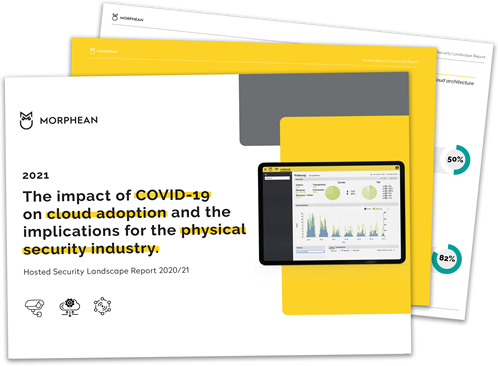Blog
COVID-19 leads to accelerated adoption of physical security in the cloud
22 Mar 2021
70% of the 1000 senior decision makers surveyed in a new independent study commissioned by Morphean believe that COVID-19 has increased the urgency for businesses to adopt hosted video surveillance (VSaaS) and access control (ACaaS) solutions. It also reveals that 78% of respondents from UK, Germany and Sweden anticipate their organisations’ use of cloud to increase in the future as a result of COVID-19.
The pandemic has caused widespread disruption and many challenges for businesses worldwide, yet it has also accelerated a digital transformation process in security that was already underway in other sectors. This drive towards moving business functions into the cloud prompted Morphean to gain a better understanding of purchasing intent of hosted security applications among a broad spectrum of buyers including HR, FM, IT and security, and the impact of COVID-19 on that purchase decision.
Adopting VSaaS and ACaaS with urgency
51% of senior decision makers were revealed to be currently using a cloud-based video surveillance (VSaaS) and/or a door entry/access control system (ACaaS), representing a 3% increase in comparison to responses from a 2019 survey (48%). This broadly reflects projected growth in the physical security market from USD $93.5b in 2020 to USD $120.3b by 2025 at a CAGR of 5.2%, driven but its low cost set up, flexible scalability and demand for real-time and remote access to security data.
Download whitepaper: Landscape Report 2020/21: Hosted Security adoption in Europe

When asked whether the pandemic had increased the necessity/urgency for businesses to adopt VSaaS and ACaaS, a significant 70% agreed. IT Services was the sector in which most respondents strongly or somewhat agreed (82%), followed by Security (73%). The results highlight a hosted physical security market which is in a strong position for 2021.
Benefits beyond security
As cloud applications are proven to deliver business continuity in challenging times, so physical security utilising the cloud can unlock many security and business benefits. 95% in the survey agreed that if an existing security system could deliver insights beyond security to assist decision making it would influence adoption. As an example, the recording and analysis of occupancy data has potential to help retailers determine the number of customers in a store at any one time, with video surveillance used to check they are following appropriate health and safety protocols.
Respondents provided their views on the benefits of digital transformation and their predictions for the future about the way their organisations will operate. 82% anticipate the levels/frequency of remote workers and flexible working to be higher post-pandemic and in the longer term than they were pre-pandemic. 50% of respondents cited more flexibility in working locations, followed by easier collaboration (44%); more cost-effective (44%); and safer / better security (38%).
SaaS: a business model for success
The ‘as a service’ (OpEx) business model on which cloud is based enables services to be paid for on a pay-per-use basis as recurring monthly payments, rather than as large upfront capital expenditure (CapEx). During the COVID-19 pandemic, significant outlay was often the first in line to be cut, and many in the security industry experienced delays in sales and installations.
From a customer perspective, 28% highlighted cost benefits as a key factor in the move towards VSaaS/ACaaS. 19% indicated that they would expect to see all-inclusive updates/upgrades and support in return for a recurring monthly fee; ideally suited VSaaS and ACaaS which are fully supported by the latest software updates and firmware upgrades.
The revelation that such technology is employed by over half (51%) of organisations across a wide range of industries is evidence that hosted security has perhaps never been more in demand. A further 30% indicated that they did not currently use such solutions, but were considering them, placing hosted security firmly on the agenda as companies prepare to face the challenges that the future will bring.
